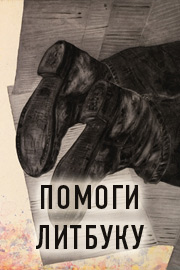***
My heart is a receptacle that keeps
All things caught by the fishnet of my iris,
They ooze like honey through my parted lips
Into the open sky to break the silence.
Restoring thus the once acquired warmth
To cooling names I eloquently utter,
As I reiterate them long before
The morning manifests its gory matter.
And finishing this off my honeyed heart
Will jettison all things my iris captured,
Then in my dream will, taking wing, depart
To contemplate the twilight void in nature.
(Slava Nurgaliev, 1988.
Translated from Russian by Yevgeniy Sokolovsky)
***
На сердце у меня хранится всё,
В глазной однажды пойманное невод,
Чтоб, исчерпав безмолвие, из сот
Медовых губ наружу вытечь в небо.
Отдать собой добытое тепло
Холодным, остывающим названьям,
Вернувшись в них задолго до того,
Как утро изойдёт кровавой ранью.
И сердце, до корней истекши в мёд,
От всех глазных добыч освободится,
Взлетит и до рассвета упорхнёт
Пустую ночь разгадывать и сниться.
Essay on translating this poem
Translating this piece by a talented modern poet Slava Nurgaliev was very difficult because of its extreme semantical complexity. I was able to penetrate some of the original's hidden meanings only in the midst of the translating process. I tried to adequately convey the original’s complicated imagery and metaphysics while preserving its rhyme and rhythm.
To translate the first stanza I had to choose a worthy equivalent for the poem’s phrase “глазной невод.” I was not sure whether “pupil” or “iris” was better, but, after giving it some thought, I realized that “iris” with its multiple nerves that resemble the “fishnet” is a better choice. The astute word “receptacle” was also a great find guaranteeing the success of the first line.
The second stanza was the most challenging part. I could not find a good rhyme for the second and fourth lines and ended up with a really inferior solution. The rhyme “objects-project” was contrived since these notions were not present in the original. I spent almost a week trying to fix this problem and ultimately succeeded with “utter-matter”.
In the third stanza I originally opted for the verbs “finalizing” (first line) and “figure out” (fourth line). However, these words are not proper for a poem, being too prosaic and colloquial, and I changed them to “finishing this off” and “contemplate”. This way the verse began to sound like a true poetic piece of art.
Last, but not least I want to thank Michael Wachtel and Elina Shvachkin for their uncompromising and dedicated editing of my work. Without their suggestions my translation would not be the quality it is.
Работа над переводом этого стихотворения талантливого современного поэта Славы Нургалиева оказалась очень трудной в силу его чрезвычайно сложной семантики. Некоторые скрытые смыслы его открылись мне непосредственно в процессе перевода. И было очень непросто передать всю метафизику и образность, сохраняя при этом ритм и рифмы оригинала.
При переводе первого катрена я споткнулся на выражении «глазной невод». Я колебался между «pupil» и «iris», но остановился на «iris» (радужная оболочка), так как многочисленные нервные окончания ее могут напоминать «fishnet» (рыбацкая сеть). Хорошей находкой оказалось и неформальное «receptacle» (вместилище).
Второе четверостишие стало самым сложным. Я не мог найти рифму для второй и четвертой строчек и чуть не остановился на таком простом варианте, как «objects-project». Но таких понятий не было в оригинале, и после чуть ли не недельных размышлений я, наконец, нашел: «utter-matter» (прим. «произнести-суть»).
Для третьего четверостишия я вначале выбрал глаголы «finalizing» (первая строчка) и «figure out» (четвертая). Но слова эти, столь разговорно-прозаические, никак не подходили для поэтического произведения. Поэтому я их заменил на «finishing this off» и «contemplate» (прим. «завершать» и «созерцать»). Таким образом, стихотворение зазвучало как настоящее произведение искусства.
И в завершение, самое главное. Хочу поблагодарить Майкла Вахтела и Элину Швачкин за профессиональную редакторскую помощь в работе над переводом, без которой он был бы несовершенен.
Slava Nurgaliev was born in Moscow, 1964. Twenty one years later he graduated from the Moscow Institute of Culture. After serving in the Soviet Army as a Russian-German interpreter he became a scholar and defended a PHD thesis on the German Book in 18th century Russia. Slava Nourgaliev is an erudite with a great range of interests. He now divides his time between Russia, where he teaches philosophy at Russian New University, and Austria, where he teaches the history of culture at Vienna conservatory. He also teaches history, ethics and theatrical art in two Vienna gymnasiums. In addition, he has been involved in theatre production, writing poetry and prose, and even playing in a band where he performs his own songs.
Yevgeniy Sokolovsky was born in Kyiv, Ukraine in 1974, and moved to the United States in 1992. He graduated from Columbia University where he pursued a major in Russian Literature and concentration in Mathematics. An accomplished mathematician and chess player, he currently works as a teacher of mathematics and chess at the International Chess Academy, New Jersey. His translations of Russian poetry have been published in various literary periodicals in the United States. His book of translations of Igor Guberman’ s quatrains came out in 2012 enjoying great popularity among the reader.





